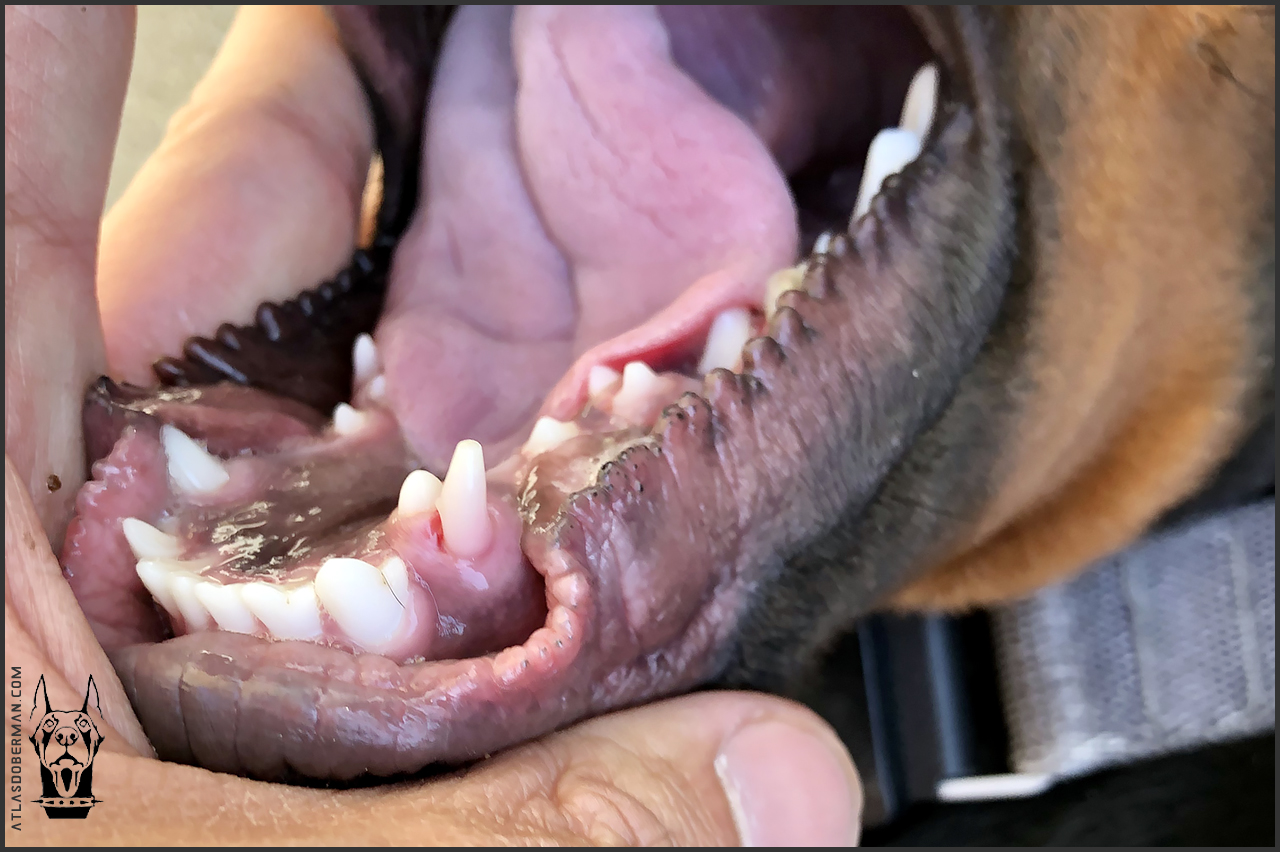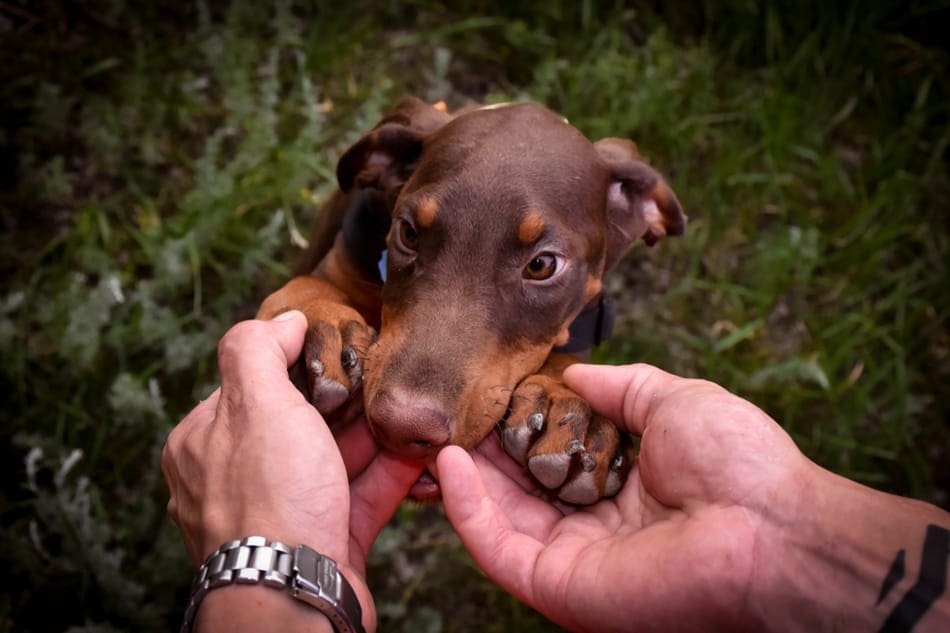When do Dobermans stop teething? It’s a question that many new Doberman owners ask, wondering when they can expect their furry friend to get past the phase of chewing everything in sight. Well, here’s an interesting fact: Dobermans typically start teething around three to four months of age, and the process usually lasts until they are six to eight months old. So, if you’re dealing with a teething Doberman, take heart, because the end is in sight!
Teething is a natural process for all puppies, and Dobermans are no exception. During this time, their puppy teeth start to fall out to make room for their adult teeth. It’s important to provide your Doberman with appropriate chew toys and discourage them from chewing on inappropriate objects. This not only helps with their teething discomfort, but it also helps promote good dental hygiene. Remember, consistency and patience are key when it comes to guiding your Doberman through the teething stage.
Teething in Dobermans usually starts at around 3 to 4 months of age and can last up to 8 months. During this time, puppies may experience discomfort and may chew on objects to relieve their sore gums. It is important to provide appropriate chew toys to redirect their chewing behavior. By the time Dobermans reach their first birthday, they should have completed their teething process. Keep an eye on your Doberman’s mouth and consult your veterinarian if you have any concerns.

When Do Doberman Stop Teething?
Teething is a natural process that all puppies go through, including Dobermans. It can be a challenging time for both the puppy and the owner, as teething can cause discomfort and pain for the dog. Understanding when Dobermans stop teething can help owners provide the necessary care and support during this period. In this article, we will explore the different stages of teething in Dobermans and discuss when they typically stop teething.
Stage 1: The Baby Teeth (Deciduous Teeth)
During the first few weeks of life, Doberman puppies do not have any teeth. However, between the age of 3 and 6 weeks, their baby teeth, also known as deciduous teeth, start to emerge. These baby teeth are small and sharp and are used for chewing and biting. The teething process for baby teeth usually starts around 4 months of age and lasts until they are around 6 months old.
During this stage, it is important to provide appropriate chew toys and treats to help soothe the puppy’s gums and encourage healthy chewing habits. It is also crucial to start basic training and socialization during this time to establish good behavior and prevent destructive chewing.
Stage 2: The Adult Teeth (Permanent Teeth)
As the baby teeth start to loosen and fall out, the permanent adult teeth begin to emerge. The eruption of the permanent teeth usually starts around 4 to 6 months of age and continues until they are around 7 to 8 months old. During this stage, the puppy will have a mix of baby teeth and adult teeth.
It is essential to monitor the puppy’s oral health during this transitional period. Regular brushing and dental care can help prevent plaque and tartar buildup, which can lead to dental issues in the future. Providing appropriate chew toys, dental chews, and bones can also aid in promoting healthy teeth and gums.
Stage 3: The Completion of Teething
By the time Dobermans reach 7 to 8 months of age, they usually have all their permanent teeth in place, and the teething process is complete. At this stage, the puppy’s mouth will be fully developed, and they will have a set of strong and healthy adult teeth.
It is important to note that every dog is unique, and the timing of teething may vary slightly for individual Dobermans. Some puppies may complete the teething process earlier or later than the average timeline. As a responsible owner, it is crucial to monitor your Doberman’s progress and consult with a veterinarian if you have any concerns.
Tips for Managing Teething in Dobermans
Managing your Doberman’s teething process can help alleviate discomfort and prevent destructive chewing behaviors. Here are some tips to help you navigate this stage:
- Provide appropriate chew toys and treats to satisfy the puppy’s chewing needs.
- Regularly inspect the puppy’s mouth and gums for any signs of infection or dental issues.
- Start basic obedience training and socialization to establish good behavior.
- Use positive reinforcement techniques to encourage appropriate chewing habits.
- Consult with a veterinarian for advice on dental care and teething remedies.
- Avoid giving the puppy items that are too hard or can break into small pieces, as they may pose a choking hazard.
- Consider using dental chews or toys that help clean the puppy’s teeth and gums.
- Be patient and understanding during this period, as your Doberman may experience some discomfort and behavioral changes.
- Provide a balanced and nutritious diet to support healthy teeth and overall growth.
Conclusion
The teething process in Dobermans typically begins around 4 months of age with the eruption of their baby teeth. It continues as the baby teeth fall out and are replaced by permanent adult teeth until around 7 to 8 months of age. It is vital for owners to provide appropriate dental care, chew toys, and training during this period. Every Doberman is unique, so it’s essential to monitor your puppy’s progress and consult with a veterinarian if needed. With proper care and support, your Doberman will have a healthy and strong set of adult teeth.
Key Takeaways
When do Dobermans stop teething?
- Dobermans usually stop teething around 6 to 7 months of age.
- Teething can be a challenging time for Doberman owners as they may chew on furniture, shoes, and other items.
- Providing appropriate chew toys and regular exercise can help redirect their teething behavior.
- During the teething phase, it is important to monitor your Doberman’s dental health and provide proper dental care.
- Consulting with a veterinarian can provide guidance on managing your Doberman’s teething phase.
Frequently Asked Questions
Dobermans, like all dogs, go through a teething stage where they lose their puppy teeth and new adult teeth grow in. This can be a challenging time for both the dog and the owner. In this FAQ section, we will address common questions about when Dobermans stop teething and how to navigate this stage of their development.
1. At what age do Dobermans usually stop teething?
Dobermans typically stop teething between 6 and 8 months of age. This is the stage when their adult teeth have fully grown in, and they have shed all of their puppy teeth. It’s important to note that individual dogs may vary in the timing of this process. Some Dobermans may stop teething earlier or later than the average timeframe.
During the teething stage, Dobermans may experience discomfort and pain in their gums as their adult teeth emerge. It’s important to provide them with appropriate chew toys and regular dental care to alleviate any discomfort and promote healthy oral hygiene.
2. How can I tell if my Doberman is still teething?
There are several signs that may indicate that your Doberman is still teething:
– Excessive drooling: If you notice your Doberman drooling more than usual, it could be a sign that they are still teething.
– Chewing behavior: Dobermans may continue to chew on objects during the teething stage to relieve discomfort. Providing appropriate chew toys can help redirect their chewing behavior.
– Bleeding or swollen gums: If you see any bleeding or swelling in your Doberman’s gums, it may indicate that they are still teething. Consult a veterinarian for proper evaluation and guidance.
3. How should I care for my Doberman’s teeth during the teething stage?
Caring for your Doberman’s teeth during the teething stage is crucial for their oral health. Here are some tips:
– Provide appropriate chew toys: Give your Doberman safe and durable chew toys to redirect their chewing behavior away from destructive habits and onto suitable objects.
– Regular brushing: Introduce a dental care routine early on and brush your Doberman’s teeth regularly. Use a dog-specific toothbrush and toothpaste to maintain their oral hygiene.
– Veterinary dental check-ups: Schedule regular dental check-ups with your veterinarian to monitor your Doberman’s dental health and address any concerns or issues that may arise.
4. Are there any specific teething remedies for Dobermans?
While there are no specific remedies for teething in Dobermans, there are some measures you can take to alleviate their discomfort:
– Frozen treats: Provide your Doberman with frozen treats like ice cubes or frozen dog-friendly treats to help soothe their gums.
– Wet washcloth: Dampen a washcloth and freeze it. Give it to your Doberman to chew on, as the cold and texture can provide relief.
– Teething toys: Look for teething toys specifically designed for dogs, as they can help massage your Doberman’s gums and provide relief.
5. Can I still train my Doberman during the teething stage?
Absolutely! Training should continue during the teething stage to maintain consistency and reinforce good behavior. However, it’s important to be understanding of your Doberman’s discomfort and adjust your training approach accordingly:
– Focus on positive reinforcement: Use rewards and praise to motivate your Doberman during training sessions, as this encourages them to engage without causing additional discomfort.
– Adapt training activities: Choose training activities that minimize stress on your Doberman’s teeth, such as mental exercises that stimulate their mind rather than physical exercises that involve a lot of biting or tugging.

In summary, Doberman puppies typically start teething around 3-4 months of age.
The teething process can last for several months before it is fully completed, usually by the time the puppy is 6-7 months old. During this stage, it is important to provide appropriate chew toys and supervise your puppy to prevent them from chewing on inappropriate objects.
